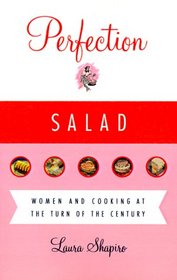Search -
Perfection Salad: Women and Cooking at the Turn of the Century
Perfection Salad Women and Cooking at the Turn of the Century
Author:
Perfection Salad presents an entertaining and erudite social history of women and cooking at the turn of the twentieth century. With sly humor and lucid insight, Laura Shapiro uncovers our ancestors widespread obsession with food, and in doing so, tells us why we think as we do about food today. — Amazon.com Review — Perfection Salad, a dish that ... more »
Author:
Perfection Salad presents an entertaining and erudite social history of women and cooking at the turn of the twentieth century. With sly humor and lucid insight, Laura Shapiro uncovers our ancestors widespread obsession with food, and in doing so, tells us why we think as we do about food today. — Amazon.com Review — Perfection Salad, a dish that ... more »
ISBN-13: 9780865474864
ISBN-10: 0865474869
Publication Date: 4/1995
Pages: 292
Edition: Reprint
Rating: ?
ISBN-10: 0865474869
Publication Date: 4/1995
Pages: 292
Edition: Reprint
Rating: ?
0 stars, based on 0 rating
Publisher: North Point Press
Book Type: Paperback
Other Versions: Hardcover
Members Wishing: 4
Reviews: Amazon | Write a Review
Book Type: Paperback
Other Versions: Hardcover
Members Wishing: 4
Reviews: Amazon | Write a Review
Genres:
- Cookbooks, Food & Wine >> Cooking Education & Reference >> History
- Cookbooks, Food & Wine >> General
- Nonfiction >> Social Sciences >> Sociology >> General
- Nonfiction >> Women's Studies >> History




